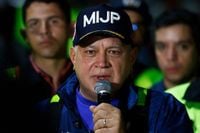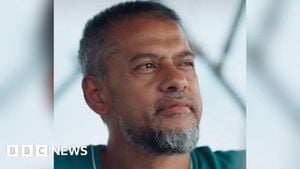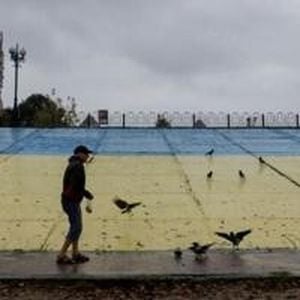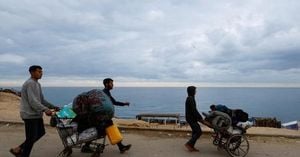In a week marked by emotional testimony, political finger-pointing, and growing international outcry, the ongoing U.S. immigration crisis has taken center stage in both domestic and foreign headlines. From the streets of Miami to the neighborhoods of Chicago and the halls of Caracas, the consequences of American immigration enforcement—especially under the Trump and Biden administrations—are being felt by families, lawmakers, and entire communities.
On October 12, 2025, Republican congresswoman María Elvira Salazar of Florida sat down with social media influencer Alexander Otaola on the YouTube program El Mañanero to discuss the fate of Cuban migrants holding the controversial I-220A immigration form, as well as the broader future of Cuba. Otaola, never one to mince words, argued for the mass expulsion of Cubans with I-220A status from Miami. In his view, this form has become a loophole abused by individuals with connections to the Cuban regime, who he believes are undeserving of the benefits it confers. "The fair solution would be a widespread expulsion," Otaola insisted, making clear his stance on the matter.
Salazar, however, offered a more nuanced perspective. "I am a member of the Trump group, but I do not believe that Venezuelans should lose TPS or the legality of cases with I-220A. Cubans have the Cuban Adjustment Act which allows them to obtain their citizenship. Why would that privilege be taken away from them?" she asked, according to the program. She emphasized the importance of case-by-case reviews, arguing that "the righteous should not have to pay for the sins of the wicked." Salazar pointed to the role of Immigration and Customs Enforcement (ICE), noting, "To verify each case, there is ICE, which during the Trump administration we allocated 150 billion dollars to." Yet, she lamented, "ICE's controls on immigrants are not functioning effectively."
Both Salazar and Otaola directed sharp criticism at the Biden administration, blaming its "open border" policies for what they described as a crisis that has allowed criminals and drug traffickers to enter the United States. "Now we are like the pendulum, because we went from Biden's chaos to the other extreme. I want everyone to understand that Biden is the main culprit for leaving the disaster at the border for four years," Salazar remarked. Despite the heated rhetoric, she made clear her belief that "the United States has the technical and financial capacity to review each case and prevent Cubans with I-220A, who are good people, professionals coming to contribute to this country, from losing their legal status."
The I-220A form has become a flashpoint in U.S. immigration debates. It is, essentially, a "release on parole" order that allows certain migrants—including thousands of Cubans—to remain in the country while their immigration status is resolved. However, this status leaves many in legal limbo, unable to benefit from the Cuban Adjustment Act's path to permanent residency. Salazar has been vocal in her support for legislative initiatives to grant parole to these migrants, thereby enabling their eligibility for the Cuban Adjustment Act. She has also championed the Dignity Act, a broader immigration reform effort, though it has faced significant criticism and legislative hurdles.
The economic impacts of these immigration policies are also drawing attention. Salazar warned that mass deportations are negatively affecting sectors like construction, hospitality, and agriculture—industries that rely heavily on immigrant labor. She cited Federal Reserve chairman Jerome Powell, who acknowledged the economic slowdown resulting from the loss of these workers.
While political debates raged in Florida, tragedy struck in Franklin Park, Illinois. On the same day as Salazar's interview, 38-year-old Silverio Villegas Gonzalez, an immigrant father, was killed by an ICE agent moments after dropping his children at school and daycare. According to the Department of Homeland Security (DHS), Villegas Gonzalez "drove toward agents, prompting one to fire his weapon." Family members, however, dispute this account, describing Villegas Gonzalez as a hardworking man targeted during Trump-era immigration raids. His only offenses, they say, were minor traffic violations.
Surveillance footage reportedly shows ICE agents pulling Villegas Gonzalez over before shots were fired. He crashed moments later and died at the scene. In the aftermath, his sons were taken into foster care. For many in Chicago's immigrant communities, this incident reinforced longstanding fears about the reach and consequences of U.S. immigration enforcement. "He was a kid," recalled his brother Jorge from Mexico. "He hid so I wouldn’t see him crying." In Chicago, Villegas Gonzalez was known as a quiet, reliable worker—someone who toiled long hours to support his family. The DHS has pledged to conduct an internal review once local investigations conclude, but questions remain about who will ultimately be held accountable.
The reverberations of U.S. immigration policy are not confined to American soil. On October 8, 2025, Venezuelan Interior Minister Diosdado Cabello accused the Trump administration of "kidnapping" 78 Venezuelan children, alleging they remain in U.S. custody after their parents were deported. "They were kidnapped in the United States by the U.S. government; they were ripped from their parents' hands," Cabello declared during his weekly state television program. He claimed that 47 girls and 31 boys were still being held in U.S. immigrant detention centers, calling the separations a "crime against humanity."
Cabello's accusations come amid tense relations between Caracas and Washington, despite a repatriation agreement signed in January 2025 that has allowed more than 12,000 Venezuelans to be deported in 74 flights. On October 8, a new flight from El Paso, Texas, arrived in Venezuela carrying 197 deportees, including four children. Cabello denounced what he described as the hypocrisy of U.S. migration policy—promoting the "American dream" while "ripping families apart." Venezuelan officials previously reported the return of four children in September, thanking former First Lady Melania Trump for her intercession, but urged the U.S. to "continue interceding for the return of all."
This humanitarian crisis, as described by Cabello, highlights the broader consequences of U.S. immigration enforcement: families separated, children left in limbo, and communities on both sides of the border grappling with uncertainty. The U.S. has defended its actions as part of lawful deportation operations, but critics—both domestic and international—see a system in need of urgent reform.
As debates continue in Congress, at kitchen tables in Miami and Chicago, and on television screens in Caracas, the human stories at the heart of the immigration crisis remain impossible to ignore. Whether through legislative reform, administrative review, or cross-border diplomacy, the pressure is mounting for solutions that balance security, compassion, and the rule of law.





